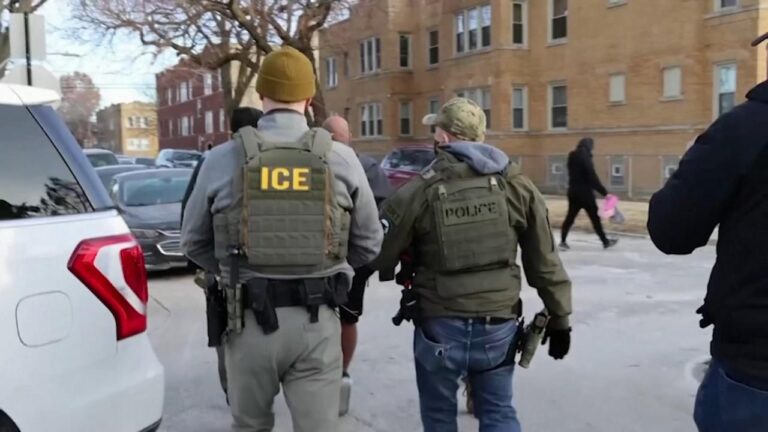Extensive Immigration Enforcement Operation Leads to Over 400 Arrests in Chicago Region
Comprehensive Crackdown Disrupts Criminal Networks Throughout Chicago
In a notable law enforcement initiative spanning the Chicago metropolitan area, authorities have apprehended more than 400 individuals suspected of involvement in various criminal activities linked to immigration violations. This large-scale operation, orchestrated by a coalition of federal, state, and local agencies, targets illicit organizations engaged in offenses such as drug trafficking, human smuggling, financial fraud, and violent gang activity. Officials describe this coordinated effort as a critical step toward enhancing public safety and curbing criminal enterprises that threaten community stability.
Arrests have been made in connection with:
- Human trafficking operations exploiting at-risk groups
- Drug distribution networks controlling major transportation corridors
- Complex fraud schemes defrauding banks and government assistance programs
- Violent gangs involved in armed conflicts and territorial control
Investigations remain active, with additional detentions anticipated as authorities follow new leads. Early seizures include considerable quantities of narcotics, firearms, counterfeit identification, and cash, highlighting the multifaceted nature of the criminal activities disrupted.
| Crime Category | Number of Arrests | Primary Offenses | Confiscated Items |
|---|---|---|---|
| Drug Trafficking | 180+ | Possession and Distribution | Over 50 kg of narcotics, 15 firearms |
| Human Trafficking | 90+ | Smuggling and Exploitation | Fake IDs, large sums of cash |
| Fraud Rings | 80+ | Financial Fraud | Electronic devices, forged documents |
| Violent Gangs | 60+ | Weapons offenses, Assault | Firearms, ammunition |
Strategic Coordination and Enforcement Tactics Among Agencies
The Chicago-area enforcement campaign reflects an intensified partnership among federal, state, and local law enforcement bodies. A senior immigration official reported that the operation has resulted in over 400 arrests, underscoring a robust commitment to enforcing immigration laws while prioritizing community safety. The approach integrates synchronized raids, real-time intelligence exchange, and multi-agency task forces working collaboratively to dismantle criminal networks.
The operation’s core objectives include:
- Locating and detaining individuals with outstanding immigration-related warrants.
- Engaging with communities through outreach programs to raise awareness about enforcement activities and available support services.
- Utilizing cutting-edge technology such as data analytics and surveillance tools to enhance operational effectiveness.
- Adhering strictly to legal protocols to protect constitutional rights throughout the enforcement process.
| Agency | Function | Key Role |
|---|---|---|
| ICE (Immigration and Customs Enforcement) | Lead Enforcement | Coordinating arrests and intelligence operations |
| Chicago Police Department | Local Enforcement | Supporting field operations and case management |
| U.S. Border Patrol | Support and Surveillance | Providing aerial reconnaissance and logistical assistance |
Community Reactions and Social Implications of Mass Arrests
The extensive enforcement action, resulting in over 400 arrests, has elicited a range of responses from local communities and advocacy organizations. Many residents voice concerns about the disruption to families and the broader social fabric, particularly in neighborhoods already facing economic challenges. Community advocates urge enhanced communication between law enforcement and local leaders to ensure that enforcement measures do not disproportionately impact vulnerable groups. In response, several nonprofits have initiated rapid-response programs offering legal aid and emotional support to those affected.
- Legal aid clinics: Providing free legal consultations and depiction for detainees and their families.
- Community engagement forums: Facilitating open dialog about immigrant rights and enforcement procedures.
- Fundraising campaigns: Assisting with bail and emergency expenses for arrested individuals.
Government officials emphasize that the operation targets individuals with prior criminal records or immigration violations, aiming to bolster public safety. Nonetheless, the community’s response highlights the tension between security objectives and humanitarian concerns. Below is a summary of perspectives from key stakeholders:
| Group | Position | Focus Area |
|---|---|---|
| Local Advocacy Groups | Critique enforcement methods, call for increased support | Human rights and family reunification |
| Law Enforcement | Defend operation, emphasize safety benefits | Crime prevention and law enforcement |
| Community Leaders | Promote dialogue and transparency | Community engagement and trust-building |
Enhancing Legal Access and Rights Awareness for Those Detained
Ensuring detainees have prompt access to legal representation is critical during immigration enforcement actions. Collaboration between authorities and community organizations is essential to provide accessible legal services at detention centers. Informing detainees about their rights and facilitating connections to pro bono or affordable legal counsel can prevent unlawful detentions and safeguard essential protections. Immigration attorneys and public defenders should prioritize rapid outreach to bridge the gap between arrest and legal support.
Empowering detainees with knowledge of their rights strengthens due process and promotes fair treatment throughout detention and judicial proceedings. Effective strategies include distributing multilingual informational materials, conducting rights education workshops within detention facilities, and establishing hotlines for immediate legal assistance.Coordinated advocacy networks play a vital role in monitoring compliance with legal standards and reporting any violations during large-scale enforcement operations.
Conclusion: Ongoing Efforts to Balance Enforcement and Community Well-Being
As this expansive immigration enforcement operation continues across the Chicago area, officials reaffirm their commitment to public safety while striving to respect community concerns. With over 400 arrests made to date, law enforcement agencies remain vigilant in their efforts to dismantle criminal networks linked to immigration violations. Updates will be provided as the investigation advances, highlighting the evolving nature of this complex enforcement landscape.





